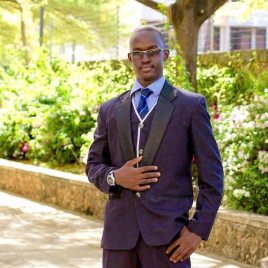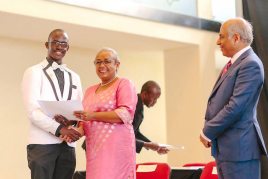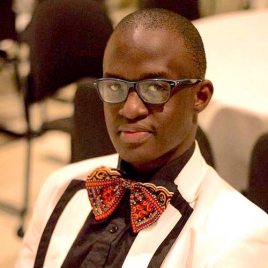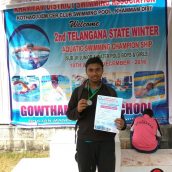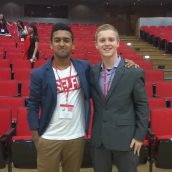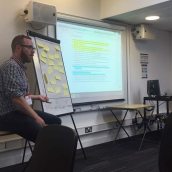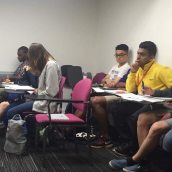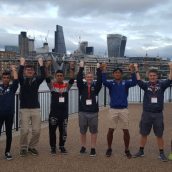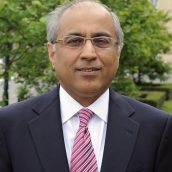Joshua Abuto (Class of 2016): Wanting to make a difference
Joshua Abuto tells an inspiring and promising tale of what drives him to sustain his vision of making a difference in the lives of his fellow citizens in Kenya.
“My dad once told me, 'You will never be judged by your potential but rather by your actions.'” Those words that Joshua’s father uttered to him permanently entrenched themselves in his mind.
And what exactly does Joshua want to accomplish to improve the lives of citizens of his home country after he completes his college studies in the United States?
“After my education, I will return home to foster change and development in Kenya to the best of my ability,” he states.
His focus will be on urban planning of cities, as well as “developing a skills approach to learning when it comes to running local systems.” He believes technology is a vital and integral part of systems organisations and can be used to enhance the functioning of professional organisations for the betterment of society.
A 2016 graduate of the Aga Khan Academy Mombasa, Joshua is currently in his second year at the University of Texas at Arlington on a scholarship where he is studying computer science and engineering. He says his interest in his chosen area of study “was induced by my love for problem solving… problem solving in real life situations through technological solutions.”
He credits the Academy for him being able to obtain the generous scholarship under the transfer honours scholarship that has allowed him to get an excellent education at a first-rate university.
“Because of my GPA, and the newly formulated agreement between Aga Khan Academies and the University of Texas at Arlington, I was able to procure my scholarship worth $46,500,” he says, expressing gratitude.
Joshua believes that his route to success thus far has also been due to the International Baccalaureate (IB) programme at the school.
“I feel like the IB gave me a step ahead into university because I was able to get my Academy college credits transferred. However, what really keeps IB a step ahead of all other curriculums is the rigour of the Diploma Programme as a whole and most especially the transdisciplinary skills we obtain such as self-management, organisational skills and time management. We are also forced to make decisions that are an epitome of any university’s expectation.”
In addition to academics, co-curricular activities are an integral of the Academy. Joshua played basketball and soccer. He also represented the school in the 33rd annual East African Model United Nations (MUN) conference in Nairobi. This prepared him to participate in his freshman year as a vice-chair and chair leading a special committee in the Wisconsin High School MUN Conference. In his sophomore year, he participated in both the Chicago MUN conference and Texas MUN conferences. He received the "Distinguished Delegation" award for his participation.
While at the Academy, Joshua was also instrumental in starting the MAD Odeum, a bi-weekly platform showcasing musical talent in senior school students. He carried his interest in music in his freshman year by joining the University of Wisconsin-Milwaukee Jazz Ensemble. He learnt jazz and improved his skills in playing the trumpet. He hopes to perfect his skills in playing the trumpet and aims to pass his skills to his peers.
Joshua holds dear the many lessons learnt at the Academy. He says he particularly benefited from his involvement in the creativity, action, service (CAS) programme at the Academy – he feels CAS reshaped his personality and awakened in him the urge to rewrite his old script and change his old ways of thinking. The Academy’s CAS requisite instils in students the importance of leading balanced and well-rounded lives outside the world of scholarships and academic studies. CAS includes a wide range of arts activities, sports, expeditions in local and international projects and participation in community and social service activities that the students can choose from.
A firm believer in the power of technology to move communities forward, Joshua went to great lengths while at the Academy to launch a community and service project where he taught local high school graduates computer skills.
“I feel like one of the biggest values the Academy instilled in me was the art of giving back to the community. This includes respecting concepts such as international mindedness, ethics, pluralism and civic responsibility. Those creeds will essentially be my mindset along the road of life and when I go back to work on fostering development in Kenya.”
Reminding himself of his father’s mantra, he says, “I believe that we should spend less time talking and just do it. That is the only way to be phenomenal.”
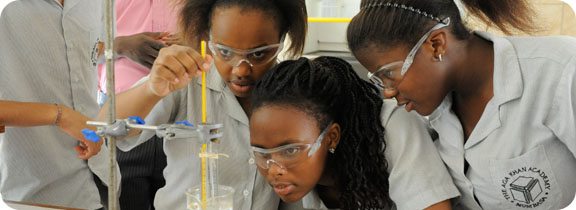
International Baccalaureate
The Aga Khan Academy Mombasa follows the principles of the International Baccalaureate (IB) and is an authorised IB World School.
The International Baccalaureate is a non-profit educational foundation, motivated by its mission to create a better world through education.
The three IB programmes offered at the Academy help develop the intellectual, personal, emotional and social skills to live, learn and work in a rapidly globalising world.
The three programmes are:
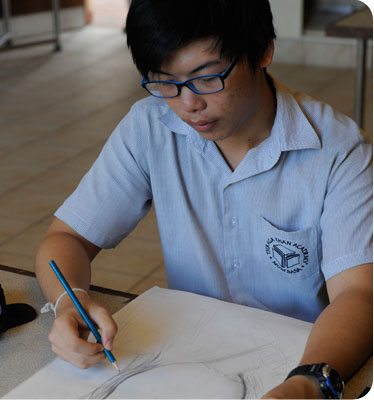
Primary Years Programme
The Primary Years Programme (PYP) at the Academy, for students aged 6–10, focuses on the development of the whole child, addressing social, physical, emotional, and cultural needs, while giving students a strong foundation in all of the major areas of knowledge. Through the PYP, children become aware of and sensitive to the points of view of people in other parts of the world.
Middle Years Programme
The Middle Years Programme (MYP), for students aged 11–16, integrates the study of all the major disciplines, including languages, sciences, literature and the social sciences, mathematics, arts, technology and physical education. The MYP normally includes a service component designed to encourage students to become involved with their communities.
Diploma Programme
The Diploma Programme (DP), for students aged 16–19, is a two-year course of study that prepares students for university. All DP students study languages, a social science, an experimental science, mathematics and, usually, an arts subject.
At the same time as it provides a form of academic passport, the DP generally fulfils the requirements of a student's national education system. Each student's performance is evaluated by independent examiners and measured by his or her levels of knowledge and skills relative to set standards applied to all schools.
Aims of the IB programme
Founded in 1968, the International Baccalureate currently works with 3,423 schools in 141 countries to develop and offer their programmes to over one million students.
Their mission statement declares: "The International Baccalaureate aims to develop inquiring, knowledgeable and caring young people who help to create a better and more peaceful world through intercultural understanding and respect."
"To this end the organisation works with schools, governments and international organisations to develop challenging programmes of international education and rigorous assessment. These programmes encourage students across the world to become active, compassionate and lifelong learners who understand that other people, with their differences, can also be right."
The IB is more than its educational programmes and certificates. At heart they are motivated by a mission to create a better world through education.
They value their hard-earned reputation for quality, for high standards and for pedagogical leadership.
They achieve their goals by working with partners and by actively involving stakeholders, particularly teachers.
For further information please visit the IB website.
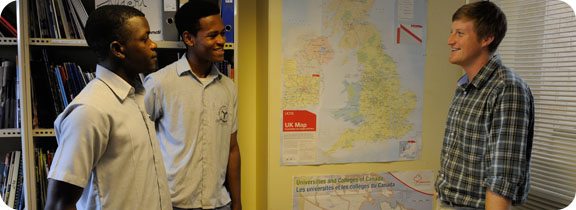
Diploma Programme
The Aga Khan Academy Mombasa has been an International Baccalaureate (IB) World School since May 2005. We offer the IB Diploma Programme (DP) to students in the final two years of school (aged 16–19).
The Diploma Programme is a demanding, pre-university-level course of studies. It is internationally recognised by over 2,000 universities worldwide.
The DP has a reputation for rigorous assessment of student achievement. Each student’s performance and level of knowledge are examined internally by teachers according to set criteria. They are also assessed externally by independent examiners according to global standards applied to all IB schools.
Our students study all the subjects covered in a traditional, broad curriculum, including languages, social sciences, experimental sciences, mathematics and the arts. The DP also takes the curriculum a step further through three unique programmes:
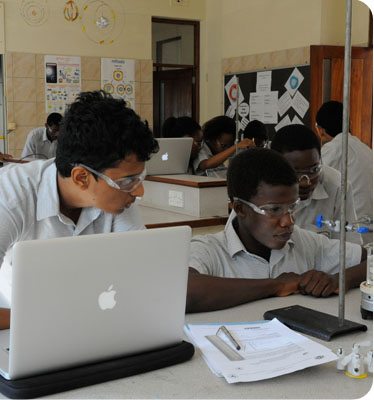
- Theory of knowledge
- Creativity, activity, service
- Extended essay
Theory of knowledge
Theroy of knowledge (TOK) is an interdisciplinary requirement unique to the International Baccalaureate Diploma Programme. It encourages students to reflect on the knowledge they gain both inside and outside the classroom.
One hundred hours of classroom time are dedicated to the TOK programme. We challenge our students to question the nature of knowledge across disciplines, to recognise biases and to analyse evidence using rational thought and argument. By making our students consider and appreciate different perspectives, TOK contributes towards a pluralistic outlook.
Creativity, activity, service
Creativity, activity, service (CAS) is an important component of the IB curriculum and is required for every DP student at the Academy. Our students participate actively in a variety of creative endeavours, physical activities and community service projects. They develop self-confidence, teamwork and leadership skills, and a sense of civil responsibility.
Students take part in sustainable projects that have real and lasting effects on the greater Mombasa community. They develop strength of character and an understanding of their ability to bring about change.
The CAS programme is valued for its power to transform the lives not only of students but also the people they work with. It serves as a platform for interpersonal exchange, personal growth and greater understanding of the issues we face as a global community.
Extended essay
For the extended essay, we require students to pick a subject of their choice and research and develop this subject in a 4,000-word essay. Students may choose to investigate a subject from one of their higher-level courses more deeply. Or they can broaden their academic experience by researching a subject in a field they are not currently studying.
Through the extended essay, we introduce students to the kind of independent research and writing skills expected at the university level.
For further information on the IB Diploma Programme at the Academy, please see the admission requirements or contact us.
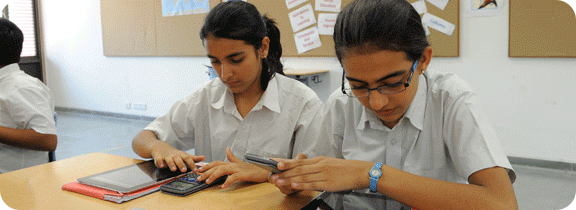
Admission Requirements
Choosing a school is an important decision in a child's and parent's life. We are here to help and answer any questions you might have.
We welcome enquiries about applying to the Academy. Our programmes are based on the principles and practices of the International Baccalaureate for primary and secondary-level students. The admission requirements for all the Academy's programmes, including language requirements, are outlined below.
Admission is competitive and based on student merit, regardless of a family’s ability to pay. The Academy endeavours to meet the demonstrated financial need of each admitted student.
Junior School
Grades 1–5: Primary Years Programme (PYP)
Students entering grade 1 ideally will have completed at least three years of nursery school and must be 6 years of age by 1 September of the year of entry.
Students may enter the first two years of the PYP without a strong prior knowledge of one of the languages of instruction, English or Hindi. However, in the last three years of the PYP, students must have a basic level of proficiency in both languages before they may be admitted.
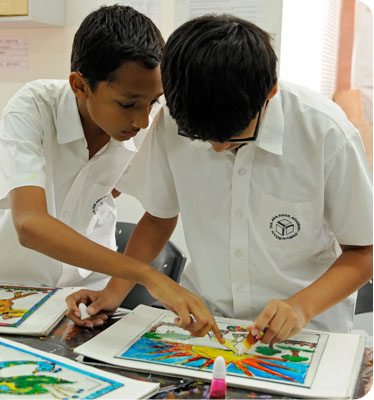 Senior School
Senior School
Students applying to the Senior School must have attained high scholastic achievement in their former educational institutions. They should also demonstrate a keen interest and participation in extracurricular activities such as sports, clubs, arts and music, and/or participation in community service projects outside the classroom.
Grades 6–10: Middle Years Programme (MYP)
Students without an intermediate level of proficiency in English may be admitted to the Middle Years Programme on a case-by-case basis. MYP students have the opportunity to study language A (language and literature) in both the official language (English) and national language (Hindi).
Grades 11–12: Diploma Programme (DP)
Applicants for the Diploma Programme must have demonstrated outstanding academic achievement as well as a record of active involvement in extracurricular and community service activities.
New students will not be accepted in the year of the Diploma exam.
Applying to the Academy
For further information about admissions, please contact the admissions office. Application and financial aid forms can be downloaded from the Application Forms page. Copies are also available from the admissions office.
*Please note that a completed financial aid form must be submitted together with the application form in order to apply for a bursary.
Tours of the Academy are held reguarly through the school year by appointment.
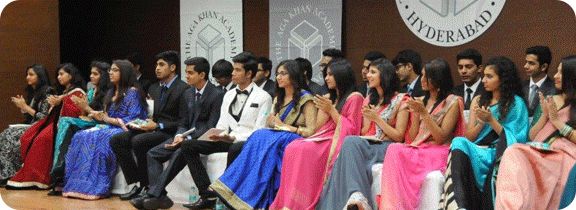
International Baccalaureate
The International Baccalaureate (IB) is a non-profit educational foundation, motivated by its mission to create a better world through education. IB programmes for students aged 3 to 19 help develop their intellectual, personal, emotional and social skills to live, learn and work in a rapidly globalising world.
The Aga Khan Academy Hyderabad has been authorised as an IB World School offering the IB Primary Years, Middle Years and Diploma Programmes.
IB World Schools share a common philosophy – a commitment to improve the teaching and learning of a diverse and inclusive community of students by delivering challenging, high quality programmes of international education that share a powerful vision.
Aims of the IB programme
Founded in 1968, the International Baccalureate currently works with schools in 144 countries to develop and offer their programmes to over one million students.
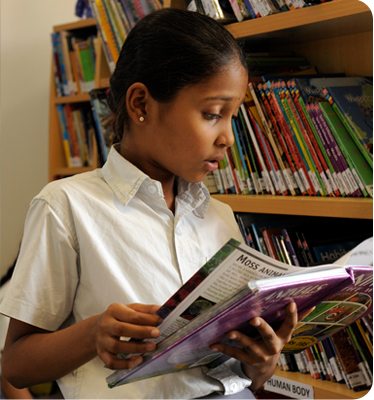 The IB mission statement declares:
The IB mission statement declares:
"The International Baccalaureate aims to develop inquiring, knowledgeable and caring young people who help to create a better and more peaceful world through intercultural understanding and respect. To this end the organisation works with schools, governments and international organisations to develop challenging programmes of international education and rigorous assessment. These programmes encourage students across the world to become active, compassionate and lifelong learners who understand that other people, with their differences, can also be right."
Primary Years Programme
The Primary Years Programme (PYP) at the Academy, for students aged 6–10, focuses on the development of the whole child, addressing social, physical, emotional and cultural needs, while giving students a strong foundation in all of the major areas of knowledge. Through the PYP, children become aware of and sensitive to the points of view of people in other parts of the world.
Middle Years Programme
The Middle Years Programme (MYP), for students aged 11–16, integrates the study of all the major disciplines, including languages, sciences, literature and the social sciences, mathematics, arts, technology and physical education. The MYP normally includes a service component designed to encourage students to become involved with their communities.
Diploma Programme
The Diploma Programme (DP), for students aged 16–19, is a two-year course of study that prepares students for university. All DP students study languages, a social science, an experimental science, mathematics and, usually, an arts subject.
At the same time as it provides a form of academic passport, the DP generally fulfils the requirements of a student's national education system. Each student's performance is evaluated by independent examiners and measured by his or her levels of knowledge and skills relative to set standards applied to all schools.
For further information about the International Baccalaureate and its programmes, please visit the IB website.
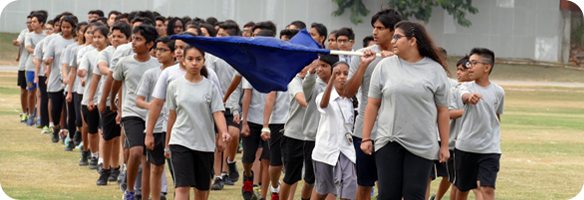
Diploma Programme
The Aga Khan Academy Hyderabad has received authorisation as an International Baccalaureate (IB) World School offering the IB Diploma Programme (DP). The programme is offered to students (aged 16–19) in the final two years of school.
The Diploma Programme is a demanding, pre-university-level course of studies. It is internationally recognised by over 2,000 universities worldwide.
The DP has a reputation for rigorous assessment of student achievement. Each student’s performance and levels of knowledge are examined internally by teachers according to set criteria. They are also assessed externally by independent examiners according to global standards applied to all IB schools.
Our students study all the subjects covered in a traditional, broad curriculum, including languages, social sciences, experimental sciences, mathematics and the arts. The DP also takes the curriculum a step further through three unique programmes:
- theory of knowledge
- creativity, activity, service
- extended essay.
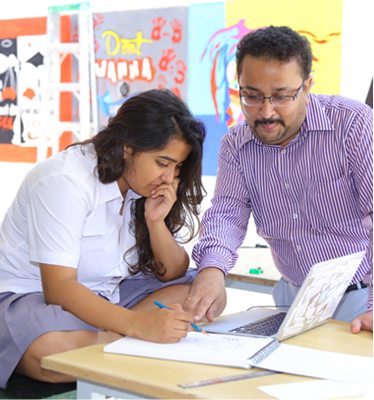 Theory of knowledge
Theory of knowledge
Theory of knowledge (TOK) is an interdisciplinary requirement unique to the International Baccalaureate Diploma Programme. It encourages students to reflect on the knowledge they gain both inside and outside the classroom.
One hundred hours of classroom time are dedicated to the TOK programme. We challenge our students to question the nature of knowledge across disciplines, to recognise biases and to analyse evidence using rational thought and argument. By making our students consider and appreciate different perspectives, TOK contributes towards a pluralistic outlook.
Creativity, activity, service
Creativity, activity, service (CAS) is an important component of the IB curriculum and is required for every DP student at the Academy. Our students participate actively in a variety of creative endeavours, physical activities and community service projects. They develop self-confidence, teamwork and leadership skills, and a sense of civil responsibility.
Students take part in sustainable projects that have real and lasting effects on the greater Hyderabad community. They develop strength of character and an understanding of their ability to bring about change.
The CAS programme is valued for its power to transform the lives not only of students but also the people they work with. It serves as a platform for interpersonal exchange, personal growth and greater understanding of the issues we face as a global community.
Extended essay
The extended essay requires students to pick a subject of their choice and research and develop it into a 4,000-word essay. Students may choose to investigate a subject from one of their higher-level courses more deeply. Or they can broaden their academic experience by researching a subject in a field they are not currently studying.
Through the extended essay, we introduce students to the kind of independent research and writing skills expected at the university level.
For further information on the IB Diploma Programme at the Academy, please see the admission requirements or contact us.
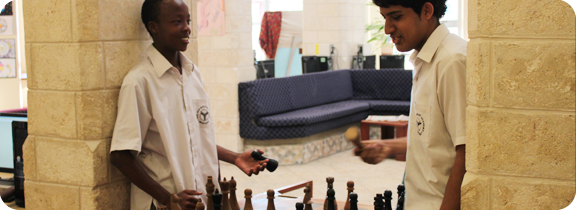
International Baccalaureate
The Aga Khan Academy, Dar-es-Salaam follows the principles of the International Baccalaureate (IB) and is preparing to become an authorised IB World School.
The International Baccalaureate (IB) is a non-profit educational foundation, motivated by its mission to create a better world through education.
The three IB programmes for students aged 3 to 19 help develop the intellectual, personal, emotional and social skills to live, learn and work in a rapidly globalising world.
Aims of the IB Programme
Founded in 1968, the International Baccalureate currently works with 3,423 schools in 141 countries to develop and offer their programmes to over one million students.
Their mission statement declares: "The International Baccalaureate aims to develop inquiring, knowledgeable and caring young people who help to create a better and more peaceful world through intercultural understanding and respect.
"To this end the organisation works with schools, governments and international organizations to develop challenging programmes of international education and rigorous assessment. These programmes encourage students across the world to become active, compassionate and lifelong learners who understand that other people, with their differences, can also be right."
The IB is more than its educational programmes and certificates. At heart they are motivated by a mission to create a better world through education.
They value their hard-earned reputation for quality, for high standards and for pedagogical leadership. They achieve their goals by working with partners and by actively involving stakeholders, particularly teachers.
The three programmes are:
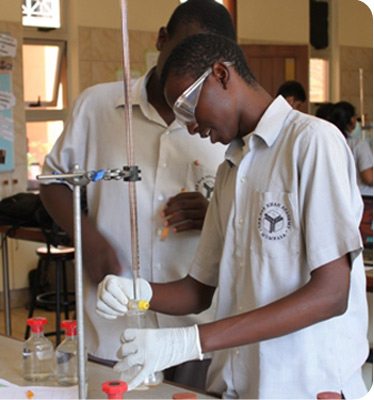 Primary Years Programme
Primary Years Programme
The Primary Years Programme (PYP) focuses on the development of the whole child, addressing social, physical, emotional and cultural needs, while giving students a strong foundation in all of the major areas of knowledge.
Through the PYP, children become aware of and sensitive to the points of view of people in other parts of the world.
Middle Years Programme
The Middle Years Programme (MYP) integrates the study of all the major disciplines, including languages, sciences, literature and the social sciences, mathematics, arts, technology and physical education.
The MYP normally includes a service component designed to encourage students to become involved with their communities.
Diploma Programme
The Diploma Programme (DP) is a two-year course of study that prepares students for university. All DP students study languages, a social science, an experimental science, mathematics and, usually, an arts subject.
At the same time as it provides a form of academic passport, the DP generally fulfils the requirements of a student's national education system. Each student's performance is evaluated by independent examiners and measured by his or her levels of knowledge and skills relative to set standards applied to all schools.
For further information please visit the website of the International Baccalaureate at http://www.ibo.org.
Samson Suhas – swimming to a better life
“I came to this school searching for better opportunities and better facilities through which I can improve in sports and excel in music and studies,” says Samson. “I didn’t have these opportunities in my previous school and didn’t get a chance to play any sport.”
Samson Suhas Srungarapti, a grade 10 student at the Academy and a professional swimmer, represented Rangareddy district at the 2nd Telangana State Winter Aquatic Championship held in Khammam district in December 2016. He came away with the bronze medal in 100mts free style and a renewed desire to participate in not just regional, but national swimming tournaments. This was the first time he had participated in a state tournament.“I want to be an Olympic swimmer. I want to win medals in Olympics for India. And alternatively, I love music and would like to be a music director or a music teacher in the future,” expresses Samson, who trains at the Academy pool for four hours a day when school is on, and six during holidays. “My father is my coach and my role model. He is my inspiration for choosing sports as my career. Without his support and commitment, I wouldn’t have achieved as much as I have in my swimming career from when I started in December 2015 till today.”
Samson has joined a swimming club for extra support and to get his know his competition better. When he is not training, he enjoys playing football with his peers, and remembers the moment the school team won the interschool football tournament as one of the most rewarding experiences at school. His favourite subject is Mathematics, because he loves the challenge of solving a tough problem. Besides swimming, music is his other great love.
“I find the Aga Khan Academy very balanced in giving opportunities for students to develop their skills in academics as well as sports, and that is the most unique thing about this school.”
Samson feels confident of participating at a national level in 2017, and determined to continue working hard on his speed, endurance, and agility even if it involves longer training hours. He has his eyes set on the international swimming circuit, and we wish him all the very best!
Sahir Devani - representing the Academy at the 2017 IB World Student Conference
Sahir Devani, grade 11, shares his experience as an Academy representative at the IB World Student Conference held at King’s College London, from 6-12 August 2017.
The IB World Student Conference was one of best weeks of my life. I was one of 279 students from all over the world who gathered to explore the theme “Well-being in a healthy world: personal responsibility and global health.” It helped me to build perspectives around global health and well-being, and meet amazing people from different cultures. It was hectic, but enriching. We started our mornings with motivational, life-changing lectures led by eminent personalities representing high ranked organisations and educational institutions like UNHCR, WHO, and KCL. These were followed by sessions in smaller groups called ‘Global Action Teams’ (GAT) and mine had 19 people from eight different countries. Our difficult job was to recognise mental health issues and well-being issues in our own schools and communities, and come up with one project that would help address the issues of ALL the communities. The difficult part was that all these countries were very different - culturally, socially, economically, and geographically. Issues were many, and needed to be prioritised to change what genuinely required help. For example: in my community, substance abuse leading to mental ill-health would be alarming, but Michaela (from the United States) was pressed to address chronic depression. Therefore, in order to recognise our GAT’s responsibility, it required discussions, colliding perspectives and debate. Filled with learning, socialising, productivity, it was undoubtedly the most engaging week of my life. All participating students were either pursuing IBDP or had just graduated IB, hence the like-mindedness that was present helped us work better. Listening to stories of students from around the world, it made me realise that I was merely ‘surviving’ IB. After the conference I’ve learnt to not view it as a threat, but as a challenge. It is often seen that teenagers are victims of mental health issues as a result of academic pressure, but by embracing our learner profile and by actively participating in our CAS activities, we can successfully turn the cause into a cure. I will be working over the coming year to implement our GAT strategy at the Academy, and I’m excited!Director's Welcome
Director of AcademiesThe Aga Khan Academies are a network of schools being established by His Highness the Aga Khan in countries across South and Central Asia, Africa and the Middle East.
As the Director of Academies, I have been entrusted with His Highness’s extraordinary vision for the Academies as a global learning community, where young people develop the capacity to become future leaders of civil society.
The underlying idea of the Aga Khan Academies network is to concentrate substantial resources on those exceptional individuals – students and teachers – who have the potential to transform society. When provided with a world-class education, exceptional students from any background can achieve their significant potential and in so doing improve their lives, the lives of their families, their communities, their country and the world.
At this time, we envisage a network of approximately 18 campuses across 14 countries that, when fully developed, will be teaching 14,000 students.
Each Aga Khan Academy will reach out to students of all backgrounds, regardless of culture, race, religion or financial circumstance.
The Academies follow the International Baccalaureate (IB) curriculum, ensuring a global standard of educational excellence and external validation through the annual IB Diploma exams.
The Academies also work to enhance the quality of teaching, the base on which good education rests. Each Aga Khan Academy will provide professional development programmes for teachers and school leaders from within the Academy as well as from government and other schools.
The students in our existing Academies are already achieving exceptional results across domains spanning academics, athletics and the arts. And our alumni, many of whom attend leading universities around the world, are demonstrating a deep sense of social responsibility and a commitment to return to serve their home countries.
Ultimately, we hope that the qualities of good leadership – sound moral judgment, self-discipline, a pluralistic outlook and civic responsibility – are the qualities that will distinguish Aga Khan Academy graduates.
"Our goal, then, is not to provide special education for a privileged elite – but to provide an exceptional education for the truly exceptional." I invite you to explore our website further to learn more about the Aga Khan Academies and the unique and innovative programme they offer.
With warm wishes,
Salim A.L. Bhatia
Director of Academies
